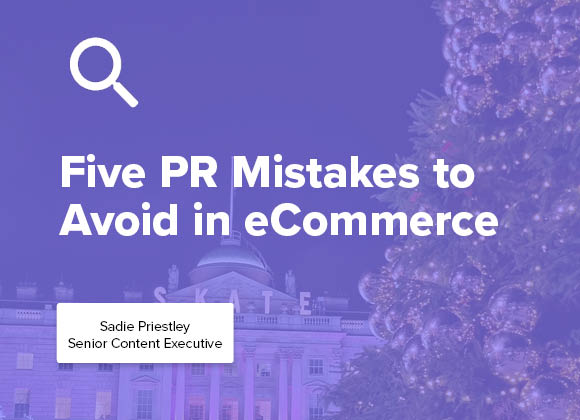You may wonder whether public relations is important for your business and your marketing strategy, let us start by saying YES. Positive publicity helps to create the right narrative when it comes to communication with your customers, investors, or prospective employees.
PR helps to create a consistent and trustworthy business identity that amplifies your purpose. All businesses have a story and PR can help you to effectively convey this story in your brand’s voice. Portraying your brand in a way you want to be known to the public.
However, if you want to build credibility and trust whilst strengthening your brand through public relations, there are a few mistakes to avoid. At eComOne, we have a passion for SEO, which encompasses content and Digital PR within our unique SEO strategy. Our Senior Content Executive, Sadie Priestly is here to share what she thinks you should be avoiding.
Giving up too soon
There is no such thing as failing at getting a PR placement, just giving up too soon.
Did you know that 57% of top-tier publishers receive between 50 – 500 pitches each week? That is a lot for them to get through, so if you’re not successful with your first pitch it doesn’t mean future pitches will fail.
Keep trying, keep adapting your work, and pitching your ideas in different ways to different news outlets, if you have quality content then you will hear back from someone if you remain dedicated.
You’re also able to mix digital PR with traditional PR, so if you’re currently using press releases in newspapers don’t be afraid of looking into digital PR strategies or speaking to PR professionals. At eComOne, we have Digital PR specialists who can help you to grow your online store.
Not telling a captivating story
When you’re starting a PR campaign ask yourself ‘why would a journalist want to report this?’.
A common mistake is thinking what may seem like big news to your company, such as a new team member or department opening will captivate the general public, but for the most part, it won’t.
This sort of information is best kept for internal blogs and social media posts rather than digital PR campaigns. Journalists want engaging content that will contribute to the growth of your organisation but will also keep readers on their site.
A successful PR story is meaningful, adds value, is personal to your business, has unique and original content, influences public perception, is relevant, provokes emotion, or educates. You should also make sure any claims in your campaign can be backed up with relevant data from reliable sources.
Not being consistent
Don’t think that one great PR placement is all you need. In order to keep your company’s name in consumers’ minds you need consistent PR that will help to build brand loyalty, trust, and awareness.
The rule of seven states that a prospect needs to hear an organisation’s message at least seven times before they’ll take action. Therefore consistent PR is needed to keep engaging with your target audience.
Whilst remaining consistent with PR it is also incredibly important to ensure you have a high-ranking and successful website, journalists won’t want to work with uncreditable brands. Also, any traffic the PR campaign gets will fall short if prospects are met by an ill-functioning website with little content.
Ensure you’re regularly uploading blogs, your category pages have unique content, you have reliable backlinks, you’re posting on your socials and interacting with your audience. This is to prove your worth to journalists who might want to work with you.
Not knowing your target audience
Landing a PR placement feels great, however, if you haven’t taken the time to research your target audience and create a laser focus on who your campaign is for it may just be a waste of your businesses time and money.
If your PR piece is going to have any lasting benefit it needs to be seen in the right place. A wrong placement could have a negative impact on your brand, or just not get seen by the right people.
Think about age, gender, and demographic. As well as the target audience you should think about timing, even if you’re going to capture the right audience, are people going to be interested in reading about ‘the top 10 sunscreen brands’ in October?
Not maintaining relationships
Knowing a journalist’s email address does not mean you have a relationship with them. Building a relationship with trusted press takes time and effort, but it is worth it.
Build a rapport and keep in contact with journalists you’ve worked with previously, rather than treating them as disposable assets. This way they’re likely to favour you in the future, or recommend other journalists who may be better suited.
It may be helpful for you to create a list of journalists you’ve previously worked with along with their niches, that way if you have an exciting article about something very specific you know who’s best to contact.
What to do if you make a mistake
PR mistakes happen, sometimes they’re unavoidable. On occasion what you thought was going to be your best PR campaign yet can actually offend your audience, or shows your brand in a completely different light than what was intended.
Address the situation as soon as possible. People prefer when businesses are accountable and don’t try to hide or dismiss their mistakes. Apologise and remind your audience that behind the brand are humans who make mistakes and are trying their best.
Once you have held yourselves accountable and apologised, work on moving forward and showing your audience how you have learned from your mistake.
If you want more information on PR or anything related to digital marketing then get in touch with our team who are more than happy to answer any of your questions.

